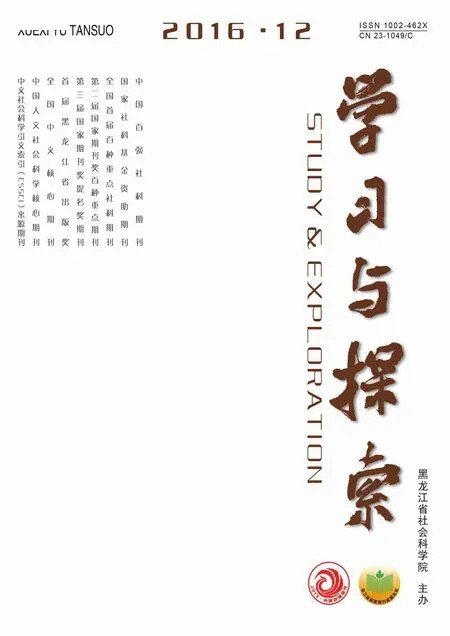ABSTRACTS
Enlightenment from Denmark’s Anti-corruption System
MA Chi
(Shanghai Academy of Social Sciences, the Center of Thoughts and Culture, Shanghai, 200020)
Social Construction and Social Cooperation in the Period of Storage Reform
WANG Dao-yong
(CPC Central Party School, Department of Sociology, Beijing 100091)
Lincoln and the Transformation of American Ideas of Rule
of Law: A Remark on His Second Inaugural
CAI Le-zhao
(Southwest University a. School of Political Science and Public Administration;b. School of Law, Chongqing 400715 )
On the Legal Safeguard Mechanism for RMB Internationalization
ZHANG Xi-feng
(China University of Political Science and Law, School of International Law, Beijing 100088)
The Impact of Financialization Development on the Real Economy in China
CHEN Xiang-guang, GUO Yi
(Renmin University of China, School of Economics, Beijing 100872)
History Trace for the Lack of Innovation by the Chinese Rich
CHEN Xiao-liang, CHEN Yan-bin
(1.Chinese Academy of Social Sciences, Institute of Economics, Beijing 100836;
2. Renmin University of China, School of Economics, Beijing 100872)
S
Enlightenment from Denmark’s Anti-corruption System
MA Chi
(ShanghaiAcademyofSocialSciences,theCenterofThoughtsandCulture,Shanghai, 200020)
Abstract:Denmark is considered the happiest country with the least corruption in the world. Denmark has an independent and effective judicial system to supervise government and legislation. The zero tolerance for corruption has become a democratic tradition in Denmark which is deeply rooted in the Danish society. Apart from Denmark’s well-developed institution system, Danish government involves itself in different areas against corruption. Government departments and NGOs in Denmark make very strict and organized anti-corruption regulations, and Danish enterprises also establish a set of anti-corruption codes. The comprehensive and effective anti-corruption system constructed by government, enterprises and society enlightens China on its way of anti-corruption.
Denmark; Anti-corruption; Institutional Design; Supervision
Social Construction and Social Cooperation in the Period of Storage Reform
WANG Dao-yong
(CPCCentralPartySchool,DepartmentofSociology,Beijing100091)
Abstract: At present, storage reform has become increasingly obvious in China’s social construction. The key step in social construction during the period of storage reform is to realize the transfer of interests between different sectors. Therefore, it is necessary to advocate an awareness of social cooperation without going to extremes inwardly, to emphasize the promotion of social institutional construction concerning about social cooperation in regime design. As for the methods, the utilisation of the transfer of interests beyond the social cooperation ought to be explored. Only in this way can we accomplish the deep reform and realize modernization continually.
Key words:Social Construction; Storage Reform; Awareness of Social Cooperation;the Transfer of Interests
Lincoln and the Transformation of American Ideas of Rule
of Law: A Remark on His Second Inaugural
CAI Le-zhao
(SouthwestUniversitya.SchoolofPoliticalScienceandPublicAdministration;b.SchoolofLaw,Chongqing400715 )
Abstract:Lincoln’s second inaugural contains his final thoughts on the American Civil War,and it is also a document which established the political religion of America. As the War went on, Lincoln have gradually realized the inadequacy of both the natural justice based on pagan tradition and the rule of law based on legal positivism, and thus resorted to a higher law based on Christian tradition, proposing the order of charity as a supplement to the order of justice.
Key words:Abraham Lincoln; American Civil War; Justice; Higher Law
On the Legal Safeguard Mechanism for RMB Internationalization
ZHANG Xi-feng
(ChinaUniversityofPoliticalScienceandLaw,SchoolofInternationalLaw,Beijing100088)
Abstract: The implementation of RMB internationalization strategy is closely associated with the national destiny,and it can not only bring about great benefits, but also a series of risks. Therefore, it is extremely necessary to build RMB business management at a global scale, supervise the RMB-related business, enhance the independence of the People’s Bank of China, and improve the system of RMB issuance, which could provide legal safeguard mechanism for the RMB internationalization.
Key words:Internationalization of RMB;the Legal Safeguard Mechanism;Franchise;the Power of Supervision;the System of RMB Issuance
The Impact of Financialization Development on the Real Economy in China
CHEN Xiang-guang, GUO Yi
(RenminUniversityofChina,SchoolofEconomics,Beijing100872)
Abstract:Financialization is a kind of economic phenomenon associated with the development of monetization, money capitalization and capital virtualization, making the possession and accumulation of capital and income increasingly take the form of money and non-monetary financial assets. Along with the development of monetization, money capitalization and capital virtualization, the financialization in China is developing rapidly, affecting the development of real economy from different aspects. While stimulating the economy to some extent through the wealth effect and other channels, the development of financialization has caused a greater separation between the accumulation of real capital and the accumulation of currency capital and fictitious capital, amplified the interruption and contradiction in the process of capital accumulation, led to the expansion and contraction movement of the accumulation of currency capital and fictitious capital, as the financial prosperity disconnecting with the development of real economy. Meanwhile, having strengthened the liquidity and speculative nature of capital and the internal instability of financial system, the development of financialization would trigger financial and economic turmoil and crisis under certain conditions. Measures should be taken in China to prevent the excessive development of financialization and avoid falling into the financialization trap.
Key words:Financialization; Capital of Financialization; Financial Expropriation; Wealth Effect
History Trace for the Lack of Innovation by the Chinese Rich
CHEN Xiao-liang, CHEN Yan-bin
(1.ChineseAcademyofSocialSciences,InstituteofEconomics,Beijing100836;
2.RenminUniversityofChina,SchoolofEconomics,Beijing100872)
Abstract:In Chinese history, there were many super rich who are richer than the current rich. The rich mainly distributed in monopoly industries such as salt, iron, coin-minting (bank), foreign trade. They accumulated wealth mainly by rent-seeking instead of innovation. We call the Chinese rich follow “the pattern of wealth accumulation without innovation”.What’s worse,“the pattern of wealth accumulation without innovation” was self-perpetuating. It can inhibit innovation by squeezing sources used for innovation and inducing social elite depart from innovation. The key to break “the pattern of wealth accumulation without innovation” is to cut the rights hold by the government and eliminate the space for rent-seeking. In that case, China can cultivate rich with enough innovation activities.
Key words:Chinese Rich; Monopoly Privilege; Rent-seeking; the Pattern of Wealth Accumulation without Innovation

